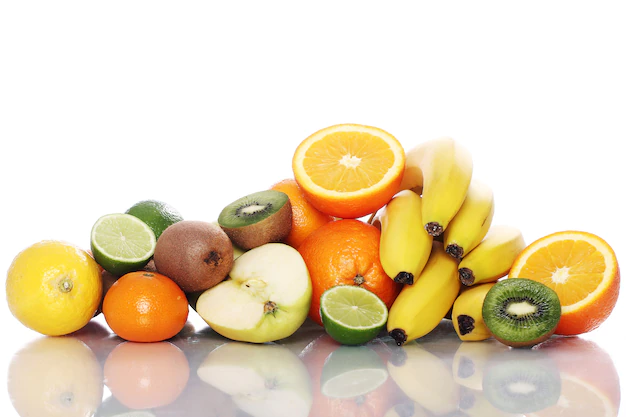There’s no better time than fall to get your fill of produce that’s rich in both jewel tones and heart-healthy nutrients. Heart disease is the leading cause of death in the United States, according to the Centers for Disease Control and Prevention. Research has shown that one way to lower your risk of heart disease is by eating a plant-based diet. A study published in January 2022 in the journal Science China examined the fruit and vegetable consumption of 100,728 participants in China. The researchers observed that increasing fruit and vegetable consumption, especially fruit, was associated with less cardiovascular disease and early death. Participants with the highest consumption of fruits and vegetables had a 13 percent lower risk of all-cause mortality, including heart disease.
“Not only are plants packed with vitamins and minerals, they also have nutrients like phytochemicals that have anti-inflammatory and cholesterol-blocking properties,” says Mary Finckenor, RD, of the Atlantic Health System in Morristown, New Jersey.
Here are 11 seasonal favorites your heart will love.
1 Brussels Sprouts Are High in Fiber and Contain Antioxidants
Brussels sprouts are a cruciferous vegetable high in antioxidants, including glucosinolate, which the body turns into isothiocyanates (heart-healthy compounds) during digestion. Antioxidants may have health-protecting benefits that can help lower inflammation in the body, notes Michael S. Fenster, MD, a cardiologist and professional chef in Tampa, Florida. For example, the consumption of cruciferous vegetables high in isothiocyanates — such as Brussels sprouts — are associated with a 10 percent decreased risk of all-cause mortality, according to a study published in May 2022 in Food Chemistry.
“The modern Western diet creates chronic inflammation in the body, which is at the root of many diseases, including heart disease,” says Finckenor. This is because many Americans eat too much saturated fat and refined sugar.
Brussels sprouts are also a good source of fiber, with about 3 grams (g) per cup, and an equal amount of protein, according to MedlinePlus. According to the Mayo Clinic, fiber-rich foods can help control blood sugar and weight, both of which lower heart disease risk and help you live longer. Soluble fiber can also help lower cholesterol, a key heart disease risk factor.
2 Winter Squash Is Loaded With Antioxidants
Antioxidants called carotenoids give red, orange, and yellow produce its signature hue. Beta-carotene, alpha-carotene, lutein, and zeaxanthin are all included in this group of compounds. A meta-analysis published in April 2022 in the journal Frontiers in Nutrition concluded that these compounds may help fight oxidative stress, which has been tied to inflammation and several chronic diseases, namely, cardiovascular disease, type 2 diabetes, neurodegenerative disease, some cancers, and age-related diseases.
A half-cup of winter squash also contains 220 percent of your daily vitamin A. According to the National Institutes of Health, vitamin A has antioxidant properties that protect against heart disease.
For best results, roast or grill squash with olive oil or make roasted butternut squash soup.
3 Broccoli Is a Great Source of Fiber
Broccoli keeps growing well into the first part of fall, even in northern states. This staple is actually a type of cabbage and is a great way to add roughage to your diet. A cup of broccoli contains about 10 percent of your daily dose of dietary fiber and 2 g of protein, according to the U.S. Department of Agriculture (USDA). Eating a high-fiber diet keeps you fuller longer, which may help prevent obesity, heart disease, and diabetes, according to the Mayo Clinic.
Aside from the tried and true roasting, sautéing, or grilling methods for cooking broccoli, try using grated broccoli and its cousin, cauliflower, as a grain substitute. Here are seven broccoli-based recipes to try if you get stuck.
4 Get Beta-Carotene and Antioxidants From Sweet Potatoes
Like squash, sweet potatoes are loaded with beta-carotene, so you’ll get heart-healthy, anti-inflammatory benefits when eating them, as well as potassium — almost 12 percent of your daily dose in one medium-sized sweet potato, according to the USDA.
These spuds also have sporamins, powerful antioxidants unique to this vegetable that are being studied for their positive effects on colon cancer, according to a review published in August 2022 in the journal Antioxidants. And they’re packed with fiber, giving you almost 4 g, or 16 percent of your daily value, in a medium-sized potato with the skin, Dr. Fenster says. Bonus? You can have your sweets and eat them, too, even if you have type 2 diabetes. Sweet potatoes have a low glycemic index, meaning that a diet high in sweet potatoes doesn’t raise blood sugar even in people with diabetes, Fenster adds.
For best results, bake them with chili powder and olive oil, or roast and drizzle with a small amount of maple syrup, a natural sweetener that also has plant-based compounds that act as antioxidants, says Fenster.
5 Get Potassium From Pomegranates
Some research points to pomegranates, which are often touted as a superfood and heart-friendly, thanks to a micronutrient called ellagic acid. “Those compounds may help block the buildup of cholesterol in the arteries,” Finckenor says. Whole pomegranates are a good source of potassium, too, which is helpful for controlling high blood pressure. It’s important to note that some cholesterol medications may interact with pomegranate or its juice, according to the American Heart Association (AHA). Your doctor can let you know for sure.
You can drink pomegranate juice, but Finckenor says it’s better to eat the fruit itself to get the most fiber. Try using the seeds in oatmeal, yogurt, cereal, salad, or even guacamole. To get to the seeds, cut off the top and bottom of the fruit, then quarter the remainder. Soak the quarters in water until the seeds separate from the membrane, then drain and dry the seeds — like this.











